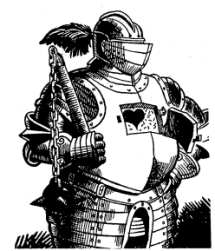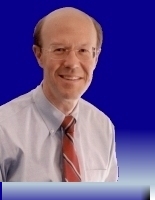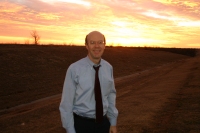Oklahomans for Anthony >
For the Record > Bob in the News >
A Fearless Public Servant:
Bob Anthony's Crusade
by Frosty Troy
The Oklahoma Observer - August 10, 1999
One man with courage makes a majority. --Andrew Jackson
Visualize this scenario: Some future group of Oklahoma historians
are mulling over this era.
"Whoa!" one of the exclaims. "I keep bumping into the name of Bob
Anthony? Anybody up to speed on this guy?"
"Funny that you should mention it," another replied. "He may be
Oklahoma's best kept secret. It's the old story of getting things done
if you don't care who gets the credit."
Who is this quiet, balding, unprepossessing Republican and why will
he be considered the most notable independent political spirit of his
time?
Anthony, scion of the C.R. Anthony Co. empire, went on the Oklahoma
Corporation Commission 10 years ago and has profoundly changed the way
that body does business.
And it you think you don't have a dog in that fight, guess again.
Virtually everything that touches commerce in Oklahoma-- utilities,
transportation, oil & gas, etc., are subject to Corporation Commission
regulation. Nobody can pick an Oklahoman's pocket quicker.
If average Sooners knew how many tens of millions of dollars
Anthony has saved them, they would erect a statue and declare a
holiday in his name.
Until Anthony showed up, the agency was a wholly owed subsidiary of
the very entities it was supposed to regulate. Honest men and women
who went on the commission ended up compromised, if not outright
corrupted, by the sea of money and influence.
There had been a few who bucked it-- the late Jan Eric Cartwright
was notable for taking on the economic powers, such as "the only phone
company in town."
Anthony has paid a price, not unlike the late Democratic governor
J. Howard Edmondson, who drove the Old Guard money changers out of the
Capitol and virtually reconstituted state government as a noble and
honest enterprise.
Consider the Anthony decade:
Under his prodding, the commission adopted the strongest ethics
policy of any state agency.
He personally sponsored and persistently defended the commission's
1992 rate order which resulted in Southwestern Bell making the largest
refund and rate reduction in state history.
In an effort to perform his constitutional duty to correct the
abuses of regulated utilities and to stop utility lawyers and
lobbyists from distributing "walking around money," he wore a wire in
a 1989-1994 FBI investigation.
It resulted in felony convictions and prison terms for an
ex-chairman and an ex-Commission general counsel who was subsequently
working for Bell. Other Bell officials involved exercised their Fifth
Amendment privilege. One of those who offered Anthony money was
hurriedly transferred to Texas.
(The Bell lawyer who went to prison, Bill Anderson, was an attorney
for the Gaylord clan when they owned Publishers Petroleum and an
express trucking company doing business before the commission.)
Processing of oil and gas applications and improved collection of
fines for violation of pollution prevention rules were streamlined.
Instead of a decade of more utility rate increases, gas, electric
and telephone customers have actually seen occasional rate reductions
and even a few refunds in recent years, thanks to Anthony.
By agency rule making and commission orders, Oklahoma now has the
two largest toll-free calling areas in America, including statewide
modern telephone equipment and technology standards which have
benefited distance learning, telemedicine and economic development,
especially in rural areas.
The commission adopted a set of modern and progressive rules to
bring customer choice and competition to gas utility service. It also
adopted requirements for a prudence review and hearing before any of
the millions of dollars in claimed "stranded costs" can possibly be
charged to ratepayers.
Deregulation of intrastate motor carriers occurred without the
disruption opponents had predicted.
He supported Governor David Walters against a legislative legal
challenge to the governor's line-item veto authority. The State
Supreme Court adopted his position, upholding the constitutional
limitation that a legislative bill must deal only with a single
subject. This opinion stopped the practice of legislative "logrolling"
in Oklahoma.
It was Anthony's request for an Attorney General's opinion-- later
supported by a Supreme Court opinion-- which reversed an attempt by
the Legislature to amend the Constitution without a vote of the
people. The amendment would have given an illegal mid-term pay raise
to the commissioners.
That decision so angered Democratic Commissioner Cody Graves he
quit the commission and turned to consulting and lobbying for those
the commission regulates.
In the simple and direct manner that has come to characterize this
remarkable public official, Anthony says of his service:
"On January 9, 1989 I accepted a position of public trust and took
a constitutional oath to enforce the law, supervise rates, correct
abuses, and prevent extortion and discrimination by regulated
companies."
He has kept his pledged word to a degree rare in politics.
Anthony took an unsuccessful fling at the Sixth District
congressional seat, only to be met by icy indifference-- if not
outright hostility-- from the moguls in the GOP who resented his
picking on their golden geese.
His position is not unlike that of one of Oklahoma's greatest
governors, Republican Henry Bellmon, who was hissed and booed by some
at a Republican state convention. his offense? Raising taxes to
improve woefully inadequate public education.
A former aide tells the story of Anthony being upbraided at a
country club for his aggressive posture on the commission-- especially
toward Bell.

Anthony says that all the facts of the bribery probe are not yet
available to the public.
It was his gutsy decision to help the FBI that nearly brought down
fellow Republican Commissioner J.C. Watts, who took "walking around
money" from utility lobbyists without reporting it as required by law.
FBI secret tapes on Watts were highly damaging.
Watts, who had friends in high places, dodged an indictment. The
FBI was appalled.
The United States Supreme Court dismissed a 1994 suit filed by none
other than Kenneth W. Starr, lawyer for Southwestern Bell. Starr
claimed Anthony was biased because he helped the FBI investigate the
bribery scheme that operated at the Corporation Commission.
In 1995, the FBI recognized Anthony with the Louis E. Peters
Service Award, its highest honor given to a citizen, "who at great
personal sacrifice, has unselfishly served his community and the
nation."
The commission adopted new exploration incentives and new
procedures to accommodate horizontal drilling, seismic testing, and
production from tight sands. Also, under Anthony's leadership they
added new oil and gas rules and utility provisions to help prevent the
premature plugging of marginal wells.
Not one in a hundred Oklahomans would recognize Anthony if they
bumped into him on the street. His efforts were usually relegated to
the business page of the Daily Disappointment-- the least read section
of the paper.
Not once in a turbulent decade did the investigative team of the
Daily Disappointment turn their resources toward overt corruption on
the commission. Anthony could have used their help.
One of their reporters said off the record that they had asked to
pursue the commission mess but were re buffed. Why did the paper look
the other way? The Gaylord clan which owns the paper was business
partners of Southwestern Bell in Texas. One Bell executive was a
fishing buddy of E.L. Gaylord, then publisher of the paper.
OG&E and ONG are important advertisers and their executives are big
dogs at the country club.
To Anthony, when the election is over, it's not what party you
belong to but your level of integrity in doing the right thing.
He has been a blend of matchless energy and a combination of
intelligence and dogged persistence.
Don't let anybody tell you there is no such thing as an honest
politician.
They haven't met Bob Anthony.
© 1999 The Oklahoma Observer
Return to Bob in the News.




